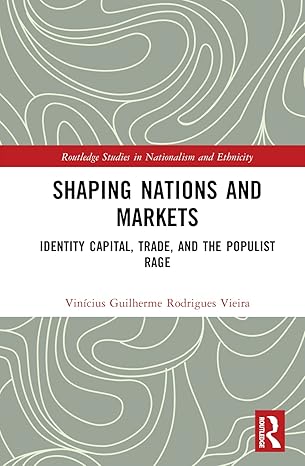
Shaping Nations and Markets (Routledge Studies in Nationalism and Ethnicity)
by: Vinícius Guilherme Rodrigues Vieira (Author)
Publisher:
Edition: 1st
Publication Date: 2023/9/15
Language: English
Print Length: 332 pages
ISBN-10: 1032386193
ISBN-13: 9781032386195
Book Description
Shaping Nations and Markets employs a mixed methods approach to contend that economic ideas, organization of domestic interests and their economic power, asymmetries of information, and political institutions do not sufficiently explain the formation of national interests in processes of trade liberalization.The author proposes that something is missing―identity capital―which also empowers economic sectors that share either liberalizing or protectionist interests. Identity capital is an economic sector’s contribution to the stability of a national identity narrative; it correlates with the degree to which the workforce of any sector represents the dominant conception of national identity. Identity capital creates political power asymmetries among those sectors and impacts the formation of populist movements in both developed and developing states. This book offers a theoretical framework to unpack national identity, trade liberalization, nationalist-populism, domestic politics, and globalization. The author argues that the key for identifying whether liberalizing or protectionist coalitions prevail in trade negotiations is identity capital. He offers a comparison of the three largest contemporary, federal, multicultural democracies: Brazil, India, and the United States, from the Doha Development Round of the World Trade Organization (WTO) in 2001, to the rise of populism in these countries in recent years.This book will be of great interest to graduate students and scholars of international relations, international studies, political science, comparative politics, and economic sociology.
About the Author
Shaping Nations and Markets employs a mixed methods approach to contend that economic ideas, organization of domestic interests and their economic power, asymmetries of information, and political institutions do not sufficiently explain the formation of national interests in processes of trade liberalization.The author proposes that something is missing―identity capital―which also empowers economic sectors that share either liberalizing or protectionist interests. Identity capital is an economic sector’s contribution to the stability of a national identity narrative; it correlates with the degree to which the workforce of any sector represents the dominant conception of national identity. Identity capital creates political power asymmetries among those sectors and impacts the formation of populist movements in both developed and developing states. This book offers a theoretical framework to unpack national identity, trade liberalization, nationalist-populism, domestic politics, and globalization. The author argues that the key for identifying whether liberalizing or protectionist coalitions prevail in trade negotiations is identity capital. He offers a comparison of the three largest contemporary, federal, multicultural democracies: Brazil, India, and the United States, from the Doha Development Round of the World Trade Organization (WTO) in 2001, to the rise of populism in these countries in recent years.This book will be of great interest to graduate students and scholars of international relations, international studies, political science, comparative politics, and economic sociology. Read more
未经允许不得转载:电子书百科大全 » Shaping Nations and Markets (Routledge Studies in Nationalism and Ethnicity)

